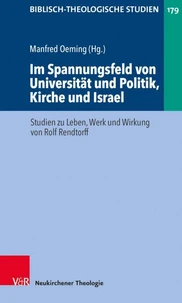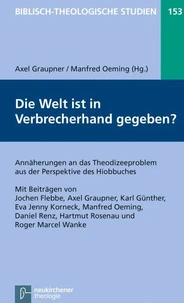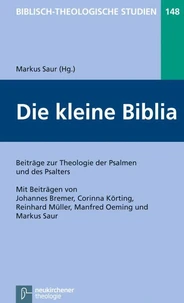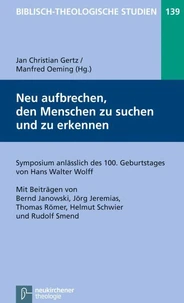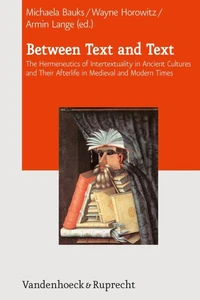Ahavah – Die Liebe Gottes im Alten Testament. Ursprünge, Transformationen und Wirkungen
Par :Formats :
Disponible dans votre compte client Decitre ou Furet du Nord dès validation de votre commande. Le format PDF est :
- Compatible avec une lecture sur My Vivlio (smartphone, tablette, ordinateur)
- Compatible avec une lecture sur liseuses Vivlio
- Pour les liseuses autres que Vivlio, vous devez utiliser le logiciel Adobe Digital Edition. Non compatible avec la lecture sur les liseuses Kindle, Remarkable et Sony
 , qui est-ce ?
, qui est-ce ?Notre partenaire de plateforme de lecture numérique où vous retrouverez l'ensemble de vos ebooks gratuitement
Pour en savoir plus sur nos ebooks, consultez notre aide en ligne ici
- Nombre de pages488
- FormatPDF
- ISBN978-3-374-05355-1
- EAN9783374053551
- Date de parution01/06/2018
- Protection num.Digital Watermarking
- Taille6 Mo
- Infos supplémentairespdf
- ÉditeurEvangelische Verlagsanstalt
Résumé
Die populäre Gegenüberstellung von dem "Gott des Zornes und der Gewalt" im Alten Testament, und dem "Gott der Liebe" im Neuen Testament wird in diesem Band umfassend untersucht. 16 Beiträge erheben den Befund im Alten Testament - von Genesis, Exodus, Leviticus bis zu den Psalmen, von den Propheten bis zum Hohenlied - wissenschaftlich und zeigen auf, wie tief sowohl das Handeln und Fühlen Gottes gegenüber dem Menschen und entsprechend das Handeln des Menschen gegenüber Gott und den Mitmenschen von ahavah = Liebe geprägt ist.
Vier neutestamentliche Analysen zur Bergpredigt, dem Johannesevangelium, 1 Kor 13 und Hebr 12 decken eine tiefe Strukturanalogie von Altem Testament und Neuem Testament auf, deren Gegenwartsrelevanz in Beiträgen zur Bedeutung des Alten Testaments für Diakonie und Predigt aufgewiesen wird. Die "Liebe Gottes" steht im Zentrum der Theologie des Alten Testaments. [Ahavah - The Love of God in the Old Testament.
Origins, transformations and effects] The popular contrasting juxtaposition of the "God of Wrath and Violence" in the Old Testament, and the "God of Love" in the New Testament, is extensively investigated in this volume. 16 contributions investigate scientifically the texts in the Old Testament, from Genesis, Exodus, Leviticus to the Psalms, from the prophets to the Song of songs, and show how deeply the actions and emotions of God towards man and man's action against God and the fellow human beings are influenced by of ahavah = love.
4 New Testament papers (on the Sermon on the mount, the gospel of John, 1 Cor 13 and Hebr 12) reveal a deep structural analogy of Old Testament and New Testament, whose present relevance is shown in contributions about social work and preaching. The "love of God" is at the center of the theology of the Old Testament.
Vier neutestamentliche Analysen zur Bergpredigt, dem Johannesevangelium, 1 Kor 13 und Hebr 12 decken eine tiefe Strukturanalogie von Altem Testament und Neuem Testament auf, deren Gegenwartsrelevanz in Beiträgen zur Bedeutung des Alten Testaments für Diakonie und Predigt aufgewiesen wird. Die "Liebe Gottes" steht im Zentrum der Theologie des Alten Testaments. [Ahavah - The Love of God in the Old Testament.
Origins, transformations and effects] The popular contrasting juxtaposition of the "God of Wrath and Violence" in the Old Testament, and the "God of Love" in the New Testament, is extensively investigated in this volume. 16 contributions investigate scientifically the texts in the Old Testament, from Genesis, Exodus, Leviticus to the Psalms, from the prophets to the Song of songs, and show how deeply the actions and emotions of God towards man and man's action against God and the fellow human beings are influenced by of ahavah = love.
4 New Testament papers (on the Sermon on the mount, the gospel of John, 1 Cor 13 and Hebr 12) reveal a deep structural analogy of Old Testament and New Testament, whose present relevance is shown in contributions about social work and preaching. The "love of God" is at the center of the theology of the Old Testament.
Die populäre Gegenüberstellung von dem "Gott des Zornes und der Gewalt" im Alten Testament, und dem "Gott der Liebe" im Neuen Testament wird in diesem Band umfassend untersucht. 16 Beiträge erheben den Befund im Alten Testament - von Genesis, Exodus, Leviticus bis zu den Psalmen, von den Propheten bis zum Hohenlied - wissenschaftlich und zeigen auf, wie tief sowohl das Handeln und Fühlen Gottes gegenüber dem Menschen und entsprechend das Handeln des Menschen gegenüber Gott und den Mitmenschen von ahavah = Liebe geprägt ist.
Vier neutestamentliche Analysen zur Bergpredigt, dem Johannesevangelium, 1 Kor 13 und Hebr 12 decken eine tiefe Strukturanalogie von Altem Testament und Neuem Testament auf, deren Gegenwartsrelevanz in Beiträgen zur Bedeutung des Alten Testaments für Diakonie und Predigt aufgewiesen wird. Die "Liebe Gottes" steht im Zentrum der Theologie des Alten Testaments. [Ahavah - The Love of God in the Old Testament.
Origins, transformations and effects] The popular contrasting juxtaposition of the "God of Wrath and Violence" in the Old Testament, and the "God of Love" in the New Testament, is extensively investigated in this volume. 16 contributions investigate scientifically the texts in the Old Testament, from Genesis, Exodus, Leviticus to the Psalms, from the prophets to the Song of songs, and show how deeply the actions and emotions of God towards man and man's action against God and the fellow human beings are influenced by of ahavah = love.
4 New Testament papers (on the Sermon on the mount, the gospel of John, 1 Cor 13 and Hebr 12) reveal a deep structural analogy of Old Testament and New Testament, whose present relevance is shown in contributions about social work and preaching. The "love of God" is at the center of the theology of the Old Testament.
Vier neutestamentliche Analysen zur Bergpredigt, dem Johannesevangelium, 1 Kor 13 und Hebr 12 decken eine tiefe Strukturanalogie von Altem Testament und Neuem Testament auf, deren Gegenwartsrelevanz in Beiträgen zur Bedeutung des Alten Testaments für Diakonie und Predigt aufgewiesen wird. Die "Liebe Gottes" steht im Zentrum der Theologie des Alten Testaments. [Ahavah - The Love of God in the Old Testament.
Origins, transformations and effects] The popular contrasting juxtaposition of the "God of Wrath and Violence" in the Old Testament, and the "God of Love" in the New Testament, is extensively investigated in this volume. 16 contributions investigate scientifically the texts in the Old Testament, from Genesis, Exodus, Leviticus to the Psalms, from the prophets to the Song of songs, and show how deeply the actions and emotions of God towards man and man's action against God and the fellow human beings are influenced by of ahavah = love.
4 New Testament papers (on the Sermon on the mount, the gospel of John, 1 Cor 13 and Hebr 12) reveal a deep structural analogy of Old Testament and New Testament, whose present relevance is shown in contributions about social work and preaching. The "love of God" is at the center of the theology of the Old Testament.





